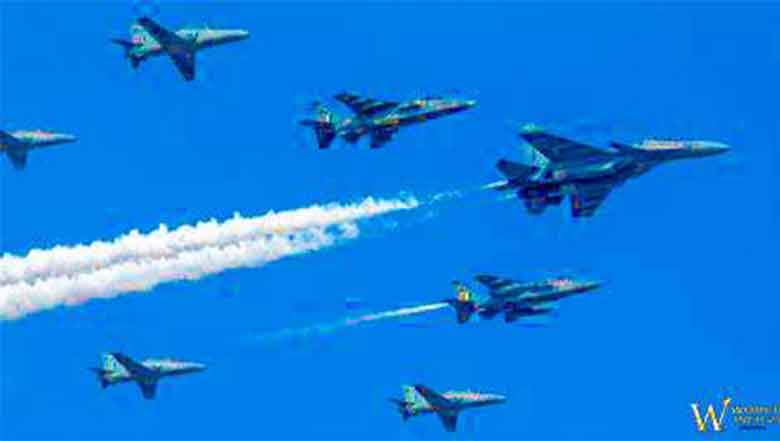🔮 Paris Airshow 2025: A Turning Point for Global Aviation and Defense
The Paris Airshow 2025 has swiftly evolved from a celebration of aerospace innovation into a reflection of our world’s most urgent challenges. As leaders in civil aviation and defense gather at Le Bourget Airport, a collective sense of responsibility takes center stage. Beyond dazzling aerial displays, this year’s expo marks a pivotal shift in how technology, safety, and geopolitics intersect in aviation.
🌐 The Shift Toward AI and Automation in Flight Control
Among the most-discussed topics at Paris Airshow 2025 is the integration of artificial intelligence (AI) into commercial flight operations. Industry pioneers argue that enhanced automation — especially during critical takeoff and landing phases — could significantly reduce pilot error.
Startups like AeroLogicAI and major firms like Boeing are showcasing new co-pilot systems powered by machine learning. These AI systems are designed to support real-time decision-making and environmental awareness, reducing reliance on human response time during emergencies.
India’s Directorate General of Civil Aviation (DGCA) has expressed interest in deploying such systems after the Air India Express Flight IX812 crash, citing automation as a potential life-saving measure in adverse weather.
⚠️ Aviation Safety Becomes a Global Responsibility
Safety protocols are undergoing a renaissance at Paris Airshow 2025. With over 2,000 aviation stakeholders in attendance, the atmosphere is ripe for international collaboration.
The European Aviation Safety Agency (EASA) has proposed new certification standards for AI-assisted landing and alert systems. These guidelines aim to harmonize safety benchmarks across Europe, North America, and Asia.
Panel discussions include testimonials from survivors and aviation safety advocates, adding a human perspective to the technical presentations. There’s a growing consensus that safety cannot be siloed — it’s a shared global priority.
💣 Focus on Dual-Use Technology Raises Ethical Questions
The blurred line between civilian and military applications is increasingly apparent. Several new aerospace products introduced at Paris Airshow 2025 are designed for dual-use: serving both commercial and defense purposes.
One striking example is a high-altitude surveillance drone presented by a European manufacturer. While advertised as a disaster-response tool, it has been tested in active military zones. This dual capability has sparked debate over regulation and ethical deployment.
Human rights organizations, including Amnesty International, have raised concerns outside the venue. Peace activists argue that the focus on weaponized drones and smart missile systems threatens to normalize conflict tech under the banner of innovation.
🚁 Next-Gen Urban Mobility and Commercial Flight Advances
While defense dominates headlines, Paris Airshow 2025 still delivers a wave of commercial breakthroughs. Urban mobility continues to be a hotbed of innovation:
- VoltaAir from Japan unveiled a fully electric Vertical Take-Off and Landing (eVTOL) aircraft, aimed at city-to-city transport.
- SkyEV, the Korean aerospace startup, is partnering with Paris municipality officials to explore pilotless air taxi trials by 2027.
- Airbus continues development on its ZEROe hydrogen-powered aircraft, reinforcing Europe’s pledge toward zero-emissions flights by 2035.
These presentations signal a clear commitment to balancing innovation with sustainability.
🛰️ Space Collaborations Fuel Optimism Amid Crisis
Amid safety concerns and defense focus, there’s a silver lining in space exploration. Agencies like ISRO (India), ESA (Europe), and NASA (USA) are leveraging the show as a forum to align missions on Mars colonization and deep space observation.
One highlight includes a panel on reusable satellite technology, which could dramatically reduce space debris. SpaceX and Blue Origin representatives were also seen attending closed-door meetings with European counterparts — a sign of growing public-private partnerships.
📢 Public Reactions: Safety First, But Don’t Ignore Innovation
Media coverage continues to highlight the Paris Airshow 2025 as a mixed emotional landscape. BBC’s latest segment, titled “Wings of Change,” interviews both engineers and grieving families affected by the recent crash, giving voice to diverse perspectives.
Meanwhile, social media hashtags like #ParisAirshowSafety and #AIInFlight are trending on X (formerly Twitter) and TikTok, with influencers livestreaming flying demos and panel recaps.
Even travel vloggers — previously known for filming jet interiors and in-flight dining — are now focusing on aircraft safety innovations and emergency response training modules.
🔮 What the Future Holds for Global Aviation
The tone of Paris Airshow 2025 makes one thing clear: the aerospace industry is at a crossroads. From electric propulsion and AI copilots to defense deterrents and public accountability, the event’s agenda mirrors the turbulence of our modern era.
Key takeaways from the expo’s early days:
- Safety is no longer a feature — it’s a foundational necessity.
- AI is fast becoming aviation’s co-pilot.
- Sustainability is no longer optional, it’s essential.
- Defense innovation is driving aerospace investment, but not without criticism.
As the show continues, aviation authorities, tech innovators, and world leaders will be under pressure to prove that their focus extends beyond profit and prestige — toward safety, sustainability, and global stability.
🔗 Related Articles from worldinfo24.online
- 🛬 Air India Crash 2025: Timeline and Global Reactions
- ⚔️ Top 10 Defense Drones Unveiled at Paris Airshow 2025
- 🌍 Hydrogen Aircraft and the Future of Eco-Friendly Aviation
📎 Suggested External References
- BBC: Paris Airshow Opens Amid Safety Concerns
- Reuters: After Air India Tragedy, Aviation Safety Takes Center Stage
- France24: Defense Firms and Climate Tech Share Spotlight
🚨 Emergency Response & Crisis Management Training Grows in Relevance
As part of the broader safety initiatives, Paris Airshow 2025 is also emphasizing real-time crisis response strategies. Emergency simulation zones, set up by European aviation authorities and international airlines, are training pilots and cabin crews on rapid evacuation protocols, medical emergencies, and automated alert systems.
One standout feature includes a virtual reality (VR) crash simulation that allows attendees to experience how new AI-alert systems could have changed the outcome of past aviation disasters. This hands-on approach is helping bridge the gap between technology development and real-world implementation.
Several nations are now pushing for mandatory VR-based training programs in pilot schools and commercial airline certification processes.
👨✈️ Airlines Push for Industry-Wide Reform
With media pressure mounting, major airlines are using Paris Airshow 2025 as a platform to demand regulatory improvements. Executives from Emirates, Lufthansa, and Singapore Airlines have spoken openly about the need for:
- Unified global maintenance standards
- Real-time cross-border weather data sharing
- International whistleblower protections for aviation staff
Industry insiders believe this unified voice could lead to the creation of an International Aviation Safety Accord — something many say is long overdue.
🌱 Sustainable Aviation Fuel Gains More Ground
Beyond aircraft design, Paris Airshow 2025 is spotlighting the fuels of the future. Sustainable Aviation Fuel (SAF), derived from waste oils and non-fossil sources, is being promoted by both private companies and public regulators.
France’s Minister of Ecology announced new incentives for airlines that switch at least 30% of their fleet to SAF by 2030. Boeing has pledged full compatibility of its commercial fleet with SAF by 2028.
Airlines see this not just as an environmental initiative but as a long-term cost-saving strategy amid rising oil prices.




